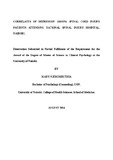| dc.contributor.author | Mbuthia, Mary N | |
| dc.date.accessioned | 2016-11-18T07:09:57Z | |
| dc.date.available | 2016-11-18T07:09:57Z | |
| dc.date.issued | 2016-08 | |
| dc.identifier.uri | http://hdl.handle.net/11295/97528 | |
| dc.description.abstract | Introduction: Spinal cord injury remains a major public health issue in developing countries as
well as worldwide. It is a devastating condition causing profound life changes for millions of
people around the world. Road traffic accidents have been reported to be a major cause of spinal
cord injury and is expected to take third position in the disease and injury burden.Patients with
spinal injury are faced by a myriad of challenges; physical, psychological, financial as well as
social challenges.Existing literature documents high rates of depression and psychological
morbidity following spinal cord injury.jykk
Thus there is need for regular screening of these patients for depression as well as identifying the
risk factors associated with depression. This will help mitigate the risk factors and ensure timely
treatment for depression for better treatment outcomes.
Setting: The study was conducted at the National spinal injury hospital, Nairobi among spinal
cord injury patients attending the out-patient clinic.
Study design: This was a descriptive cross sectional study with a sample size of (n=139) persons
who had sustained spinal cord injury with over one year duration of injury and over 18 years of
age completing a single interview for socio- demographic, pain intensity and patient health
questionnaire (PHQ-9) scales.
The objectives: To determine the factors that may be a risk to development of depression among
persons with spinal cord injury.
Data collection instruments: Socio-demographic questionnaire was used to collect
demographic data of the patients; Patient Health Questionnaire-9(PHQ-9 scale) to determine the
depression levels and Numerical Pain intensity scale used to measure the pain intensity among
the participants.
Data analysis: After data collection, the information was coded and data entered into Statistical
Package for Social Sciences version 20 (SPSS 20). Data was summarized using descriptive
statistics and presented in frequency tables and charts. Categorical data was analyzed using Chisquare
statistic with the Significance level set at <0.05. Further multivariate analysis was done
using logistic regression to investigate the independent predictive value for the identified risk
factors for depression (being quadriplegic, inadequate social support, lack of self-efficacy and
increased pain intensity), with the significance set at < 0.05.
Results:
The overall prevalence of depression according to PHQ-9 scores was 25.8%. Quadriplegic
patients were found to have 4 times risk of developing depression as compared with paraplegic
patients (OR 4.044 [95% C.I of OR 1.357- 12.051], P= 0.012);patients with severe pain intensity
were reported to have 3 fold risk of developing depression (OR 3.104 [95% C.I of OR 1.765-
5.46], P< 0.05) as compared with those who experienced mild pain or no pain at all .Other
factors that were significantly related to depression were decreased support systems (P=0.010)
and lack of self –efficacy (P=0.016). Demographic factors were found not to have a significant
relationship to depression.
Conclusions
Depressive symptoms are common among patients with spinal cord injury and more so
among those who are quadriplegic. The decreased support system, lack of self- efficacy
and increased pain intensity.The study shows that there is need for regular screening and
treatment for depression among patients with spinal cord injury.
The results of the study forms a baseline for future studies on the mental health status of
patients with spinal cord injury and further studies with larger samples are recommended
especially in Kenya. | en_US |
| dc.language.iso | en | en_US |
| dc.publisher | University of Nairobi | en_US |
| dc.rights | Attribution-NonCommercial-NoDerivs 3.0 United States | * |
| dc.rights.uri | http://creativecommons.org/licenses/by-nc-nd/3.0/us/ | * |
| dc.title | Correlates of depression among spinal cord injury patients attending national spinal injury hospital, Nairobi. | en_US |
| dc.type | Thesis | en_US |
| dc.description.department | a
Department of Psychiatry, University of Nairobi, ; bDepartment of Mental Health, School of Medicine,
Moi University, Eldoret, Kenya | |



